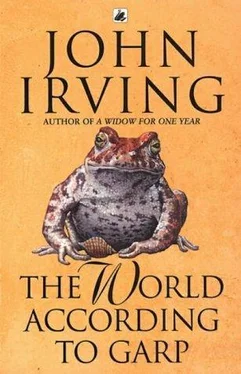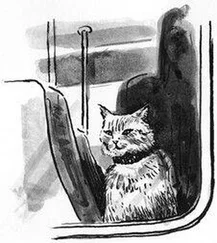“Oh no, junior high,” the girl said, laughing nervously.
“Wonderful!” Garp said. And without knowing why, he said, “I'll try to come.”
But the girl looked suddenly stricken. “No, please,” she said. “Please don't come.”
“Okay, I won't,” Garp agreed quickly.
He saw her several times after this meeting, but she never recognized him again because he shaved off his beard. “Why don't you grow another beard?” Helen occasionally asked him. “Or at least a mustache.” But whenever Garp encountered the molested girl, and escaped unrecognized, he was convinced he should remain clean-shaven.
“I feel uneasy,” Garp wrote, “that my life has come in contact with so much rape.” Apparently, he was referring to the ten-year-old in the city park, to the eleven-year-old Ellen James and her terrible society—his mother's wounded women with their symbolic, self-inflicted speechlessness. And later he would write a novel, which would make Garp more of “a household product,” which would have much to do with rape. Perhaps rape's offensiveness to Garp was that it was an act that disgusted him with himself—with his own very male instincts, which were otherwise so unassailable. He never felt like raping anyone; but rape, Garp thought, made men feel guilt by association.
In Garp's own case, he likened his guilt for the seduction of Little Squab Bones to a rapelike situation. But it was hardly a rape. It was deliberate, though. He even bought the condoms weeks in advance, knowing what he would use them for. Are not the worst crimes premeditated? It would not be a sudden passion for the baby-sitter that Garp would succumb to; he would plan, and be ready when Cindy succumbed to her passion for him. It must have given him a twinge, then, to know what those rubbers were for when he dropped them in front of the gentleman from the city park and heard the old man accuse him: “Looking for innocence to violate and defile!” How true.
Still, he arranged obstacles in the path of his desire for the girl; he twice hid the prophylactics, but he also remembered where he'd hidden them. And the day of the last evening that Cindy would baby-sit for them, Garp made desperate love to Helen in the late afternoon. When they should have been dressing for dinner, or fixing Duncan's supper, Garp locked the bedroom and wrestled Helen out of her closet.
“Are you crazy?” she asked him. “We're going out.”
“Terrible lust,” he pleaded. “Don't deny it.”
She teased him. “ Please , sir, I make a point of never doing it before the hors d'oeuvres.”
“ You're the hors d'oeuvres,” Garp said.
“Oh, thanks ,” said Helen.
“Hey, the door's locked,” Duncan said, knocking. “Duncan,” Garp called, “go tell us what the weather is doing.”
“The weather?” Duncan said, trying to force the bedroom door.
“I think it's snowing in the backyard!” Garp called. “Go see.”
Helen stifled her laughter, and her other sounds, against his hard shoulder; he came so quickly he surprised her. Duncan trotted back to the bedroom door, reporting that it was springtime in the backyard, and everywhere else. Garp let him in the bedroom now that he was finished.
But he wasn't finished. He knew it—driving home with Helen from the party, he knew exactly where the rubbers were: under his typewriter, quiet these dull months since the publication of Procrastination .
“You look tired,” Helen said. “Want me to take Cindy home?”
“No, that's okay,” he mumbled. “I'll do it.”
Helen smiled at him and nuzzled her cheek against his mouth. “My wild afternoon lover,” she whispered. “You can always take me out to dinner that way, if you like.”
He sat a long time with Little Squab Bones in the car outside her dark apartment. He had chosen the time well—the college was letting out; Cindy was leaving town. She was already upset at having to say goodbye to her favorite writer; he was, at least, the only writer she'd actually met.
“I'm sure you'll have a good year, next year, Cindy," he said. “And if you come back to see anyone, please stop and see us, Duncan will miss you.” The girl stared into the cold lights of the dashboard, then looked over at Garp, miserably—tears and the whole flushed story on her face.
“I'll miss you ,” she whined.
“No, no,” Garp said. “ Don't miss me.”
“I love you,” she whispered, and let her slim head bump awkwardly against his shoulder.
“No, don't say that,” he said, not touching her. Not yet.
The three-pack of condoms nestled patiently in his pocket, coiled like snakes.
In her musty apartment, he used only one of them. To his surprise, all her furniture had been moved out; they jammed her lumpy suitcases together and made an uncomfortable bed. He was careful not to stay a second more than necessary, lest Helen think he'd spent too long a time for even a literary goodbye.
A thick swollen stream ran through the women's college grounds and Garp discarded the remaining two prophylactics there, throwing them furtively out the window of his moving car—imagining that an alert campus cop might have seen him and would already be scrambling down the bank to retrieve the evidence: the rubbers plucked out of the current! The discovered weapon that leads back to the crime for which it was used.
But no one saw him, no one found him out. Even Helen, already asleep, would not have found the smell of sex peculiar: after all, only hours before, he had legitimately acquired the odor. Even so, Garp showered, and slipped cleanly into his own safe bed; he curled against Helen, who murmured some affection; instinctively, she thrust one long thigh over his hip. When he failed to respond, she forced her buttocks back against him. Garp's throat ached at her trust, and at his love for her. He felt fondly the slight swell of Helen's pregnancy.
Duncan was a healthy, bright child. Garp's first novel had at least made him what he said he wanted to be. Lust still troubled Garp's young life, but he was fortunate that his wife still lusted for him, and he for her. Now a second child would join their careful, orderly adventure. He felt Helen's belly anxiously—for a kick, a sign of life. Although he'd agreed with Helen that it would be nice to have a girl, Garp hoped for another boy.
Why? he thought. He recalled the girl in the park, his image of the tongueless Ellen James, his own mother's difficult decisions. He felt fortunate to be with Helen; she had her own ambitions and he could not manipulate her. But he remembered the Kдrntnerstrasse whores, and Cushie Percy (who would die making a baby). And now—her scent still on him, or at least on his mind, although he had washed—the plundered Little Squab Bones. Cindy had cried under him, her back bent against a suitcase. A blue vein had pulsed at her temple, which was the translucent temple of a fair-skinned child. And though Cindy still had her tongue, she'd been unable to speak to him when he left her.
Garp didn't want a daughter because of men . Because of bad men, certainly; but even, he thought, because of men like me .
8. SECOND CHILDREN, SECOND NOVELS, SECOND LOVE
IT was a boy; their second son. Duncan's brother was called Walt—it was never Walter, and never the German Valt ; he was simply a t at the end of a wall. Walt: like a beaver's tail smacking water, like a well-hit squash ball. He dropped into their lives and they had two boys.
Garp tried to write a second novel. Helen took her second job; she became an associate professor of English at the state university, in the town next-door to the women's college. Garp and his boys had a boys' gym to play in, and Helen had an occasional bright graduate student to relieve her of the monotony of younger people; she also had more, and more interesting, colleagues.
Читать дальше












